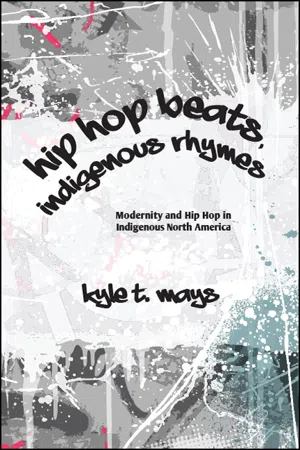
SUNY series, Native Traces
Modernity and Hip Hop in Indigenous North America
- 194 pages
- English
- ePUB (mobile friendly)
- Available on iOS & Android
About This Book
Expressive culture has always been an important part of the social, political, and economic lives of Indigenous people. More recently, Indigenous people have blended expressive cultures with hip hop culture, creating new sounds, aesthetics, movements, and ways of being Indigenous. This book documents recent developments among the Indigenous hip hop generation. Meeting at the nexus of hip hop studies, Indigenous studies, and critical ethnic studies, Hip Hop Beats, Indigenous Rhymes argues that Indigenous people use hip hop culture to assert their sovereignty and challenge settler colonialism. From rapping about land and water rights from Flint to Standing Rock, to remixing "traditional" beading with hip hop aesthetics, Indigenous people are using hip hop to challenge their ongoing dispossession, disrupt racist stereotypes and images of Indigenous people, contest white supremacy and heteropatriarchy, and reconstruct ideas of a progressive masculinity. In addition, this book carefully traces the idea of authenticity; that is, the common notion that, by engaging in a Black culture, Indigenous people are losing their "traditions." Indigenous hip hop artists navigate the muddy waters of the "politics of authenticity" by creating art that is not bound by narrow conceptions of what it means to be Indigenous; instead, they flip the notion of "tradition" and create alternative visions of what being Indigenous means today, and what that might look like going forward.
Frequently asked questions
Information
Table of contents
- Cover
- Title
- Copyright
- Contents
- Preface A Note on Language: Black English and Uncensored Mode
- Acknowledgments
- Introduction Can We Live and Be Modern and Indigenous?: Toward an Indigenous Hip Hop Culture
- Chapter One #NotYourMascot: Indigenous Hip Hop Artists as Modern Subjects
- Chapter Two The Fashion of Indigenous Hip Hop
- Chapter Three Indigenous Masculinity in Hip Hop Culture: Or, How Indigenous Feminism Can Reform Indigenous Manhood
- Chapter Four “He’s just tryna be black”: The Intersections of Blackness and Indigeneity in Hip Hop Culture
- Chapter Five Rhyming Decolonization: A Conversation with Frank Waln, Sicangu Lakota
- Conclusion “It’s bigger than Hip Hop”: Toward the Indigenous Hip Hop Generation
- Notes
- Works cited
- Index
- Back Cover